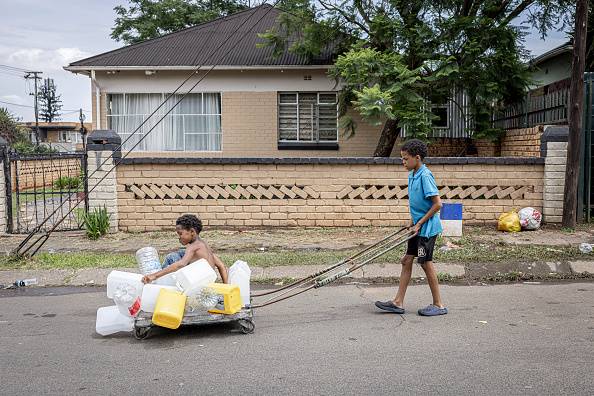
A boy pushes another boy in a trolley with empty water bottles in the neighbourhood of Coronationville in Johannesburg on December 17, 2024. (Photo by PATRICK MEINHARDT/AFP via Getty Images)
Johannesburg Water’s intake from Rand Water will be further reduced from next month as the latter’s licence to increase extraction from the Vaal River was not approved.
The municipal entity has to reduce the annual average daily demand from 1 801 megalitres a day to 1 356 by 1 September, communications officer Nolwazi Dhlamini says.
Annual average daily demand is the total volume of water delivered to the system over a year, divided by 365 days. The City of Johannesburg remains above its daily usage limit.
“This is to be achieved by reducing the daily supply in a phased manner [which started] in December 2024 with 1 600 megalitres a day,” said Dhlamini.
“From 1 February 2025, the daily available capacity from Rand Water will be further reduced to 1 500 megalitres a day and, from 1 September 2025, the supply will be reduced to … 1 356 megalitres a day,” she added.
Dhlamini said water consumption had “risen significantly”, with daily usage reaching about 270 litres per person per day, surpassing the best-practice target of 175 litres.
“Climate factors, such as prolonged droughts and unpredictable rainfall patterns, have also reduced water availability in reservoirs, further impacting the overall supply,” she added.
The increase in water demand had affected numerous reservoirs and towers and demand was exceeding available capacity.
“This has resulted in some residents experiencing poor water pressure to no water, especially in higher-lying areas. The demand for water in Johannesburg has grown, and continues to grow, as a result of economic growth and population growth,” Dhlamini said.
The city had to re-implement throttling and restrictions to “build capacity and promote equitable water distribution among all its customers”.
Throttling — which reduces water pressure and flow — takes place between 9pm and 4am, when there is minimal water consumption.
Dhlamini said besides water outages, low pressure was also to be expected. “There are planned and unplanned maintenance activities that will affect water supply.”
But critics argue that years of neglect and underinvestment in infrastructure have created a crisis that cannot be resolved through restrictions alone.
The reservoirs and towers subjected to daily throttling include Orange Farm High Level, Lawley Reservoir, Lenasia High Level, Lenasia Hospital Hill, President Park outlet, Diepsloot and Illovo.
The reservoirs and towers subjected to daily throttling through scheduled rotations include Corriemoor Reservoir, Helderkruin Reservoir, Witpoortjie Reservoir and Witpoortjie Tower.
Along with throttling, introduced in November, the City of Johannesburg implemented level one water restrictions in September, which are set to run until March.
During this six-month period, activities such as watering gardens, washing cars, cleaning driveways and filling pools or water features with hose pipes are prohibited between 6am and 6pm.
Democratic Alliance councillor Nicole van Dyk said “proactive repairs” needed to be taking place while the water was off.
Ferrial Adam, executive directive at WaterCAN, a network of water activists, reiterated the organisation’s stance that the blame for the restrictions lay with the city.
“They’ve neglected maintenance, and they neglected infrastructure for over 10 years — and now we’re dealing with the beast. So, the mess we are in is something that they need to understand was partly caused by the government.”
In November, Rand Water revealed that 2.5 billion litres of the 5.2 billion litres it provides to Gauteng municipalities daily is lost through leaks, ageing infrastructure and theft.
A dashboard developed by the department of water and sanitation, Rand Water and the Gauteng government showed that underinvestment in municipal infrastructure had led to a decline in services over the past decade.
The system has no backup capacity and load-shedding, theft and vandalism made things worse.
Excessive municipal water losses, both non-revenue and revenue, have worsened due to rapid growth in demand, driven by population increases. Additionally, many individuals, households and businesses consume more water than necessary during shortages.
Johannesburg Water said the main cause of supply disruptions in the city was that the peak demand was close to, and occasionally exceeds, the supply from Rand Water.
“The demand-supply relationship for treated water in Johannesburg is very tight and the system is vulnerable to disturbances caused by electro-mechanical breakdowns or spikes in demand caused by heatwaves,” said Johannesburg Water.
But Adam said cutting water without offering alternatives was not the right approach.
“You can’t just cut people off without giving proper alternatives. When we ask for proper alternatives, we’re not saying, ‘Let’s open up the door for permanent tankers,’ because that opens another avenue for corruption.
“There needs to be a much more concerted effort. They need to have more engagement with communities. There needs to be a structured approach. You can’t just go and cut people off,” she said.
Adam said water cut-offs were the new load-shedding.
“As soon as you get higher temperatures, you are going to get areas that are cut off at night, you are going to have water throttling, because our infrastructure needs at least three to five years to be fixed.”
“The other thing that’s a challenge is that Joburg Water does not have enough money to deal with the infrastructure, so they don’t have enough money for maintenance. Until the City of Joburg actively allocates money for water and sanitation … we are going to be in this situation.”